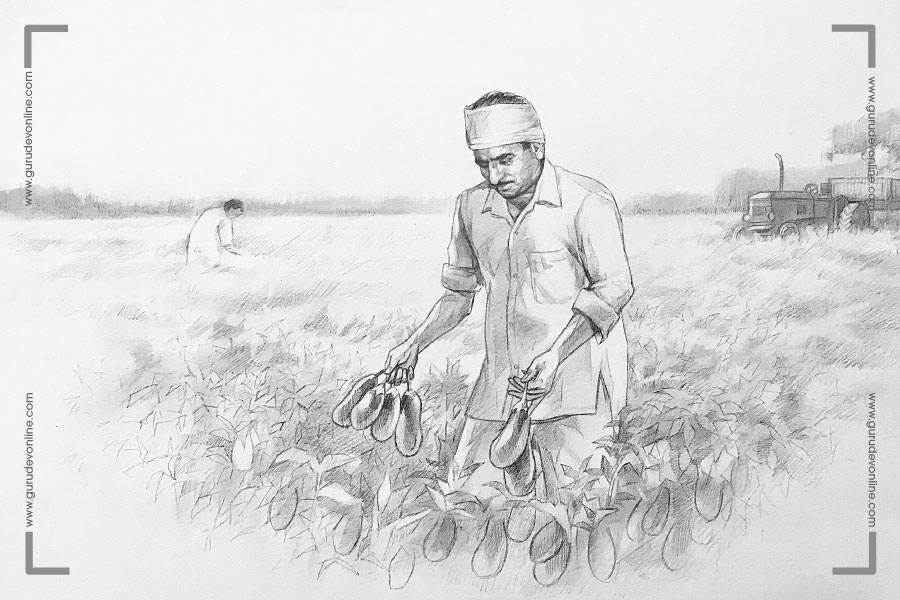THE MAHAGURU


To be free from the cycle of birth and death,
wipe clean the inner slate.
Erase each scribble. Remove every doodle.
Rid yourself of karma’s unrelenting weight.
Gurudev had mastered the science of karma yog. He understood the transactional nature of existence better than most. He worked conscientiously to exhaust his karmic debts and, as a means to that end, spent a lot of time engaged in the seva of greening places. His farm at Khandsa became not only a sanctuary where he nurtured nature but also a lush classroom where we came to learn in our suits and returned home in muddy boots.
In his inimitable style, he reminded us of aatmic equality by naming the farm cattle after deities. When he called the cows by name, they responded with moos. They could sense his arrival a few minutes before he walked through the farm’s gate. Their happy sounds alerted the farmhands that their guru was on his way. However, not all the animals on the farm were on their best behaviour. The most ill-tempered of the lot was Gurudev’s pet monkey, Bajrang. His unruly ways were the bane of the farm employees, as he was Khandsa’s ‘Dennis the Menace’. Though, around the mahaguru, he would transform into Saint Bajrang!
When Gurudev and a disciple, Giri ji, arrived at the farm one afternoon, they noticed Bajrang sulking in a corner. Gurudev inquired affectionately. “Oye Bajrang, kaisa hai?” (How are you, Bajrang?). The monkey expressed his displeasure by turning away. The mahaguru prodded him indulgently, and Bajrang responded with an incomprehensible sound. Gurudev nodded and said, “Tera kaam ho jayega” (Your work will be done). After Gurudev’s reassurance, Bajrang resumed his saintly stance (albeit only around Gurudev). Giri ji was left amused, wondering what had just happened.
When Gurudev and Giri ji returned to the farm the next afternoon, they found Bajrang in a good mood. Gurudev approached the monkey and asked, “Ab khush hai?” (Are you satisfied now?). Bajrang’s reaction was a happy dance. Sensing Giri ji’s confusion, the mahaguru pointed to the wall where a female monkey sat coyly on the parapet. Giri ji laughed as he realised his guru had played matchmaker for Bajrang. The man who claimed he belonged to no one went out of his way for his monkey, just as a father would for a son!
Gurudev spent a lot of time at the farm. He would plough the field on his tractor, pick the vegetables and milk the cows. If a calf was nearby, he would milk its mother’s udder and spout the milk into the calf’s mouth. During the harvest season, he would also assist in separating the chaff.

Gurudev picks vegetables at his farm
Bittu ji recalled that even though the work at the farm was physically exhausting and the working conditions far from ideal, the mahaguru never complained. Sometimes, the heavy lifting would result in blisters on his hands. One day, after Bittu ji brought up the subject of the toll the farm work took on Gurudev, the mahaguru explained, “I am a man of moderate means. My financial capacity to assist people is limited. I will use my body to serve regardless of how physically demanding the work is. I also drink milk from the cows who live here and eat the vegetables grown here, so I must perform the seva of tending to them.”
In 1988, Giri ji purchased a small plot of land in village Mohammedpur close to Gurgaon. Most of the land in the area was unfit for cultivation. Many of the farmers had relocated due to the aridity of the terrain and lack of yield. Gurudev personally oversaw the greening of this plot. He tilled the soil, ploughed the land, sowed seeds and planted trees. Soon after, the farm became cultivable, inspiring other farmers to re-cultivate their lands. Within no time, the small village became lush with greenery.
The mahaguru’s actions demonstrated the path to a karmically lighter existence. Under his guidance, we became more aware of our attitudes and the impact our actions had on our karmic balance sheet. We eventually learned to live a life of non-doership, detachment, and self-observation.
PREV << THE HEALER EXTRAORDINAIRE
NEXT >> THE TRANSFORMER